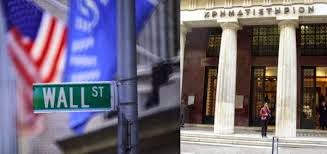US Markets
U.S. stocks closed down on Monday despite encouraging economic data as the Hong Kong protests weighed on global markets.
"It seems we're willing to ignore what is going on domestically and pay attention to the global macro newsflow," Art Hogan, chief market strategist at Wunderlich Securities, said.
Read MoreWhy Hong Kong unrest scares markets
Energy led declines on the S&P and Dow Jones Industrial Average, with Exxon Mobil and Chevron the hardest hit.
The Dow and S&P regained ground after falling about 1 percent in the open. In late-morning trade, the Nasdaq also reversed losses to turn positive briefly before trading in the red again.
"Actually I think it's pretty impressive that the market has come back," JJ Kinahan, chief derivatives strategist for TD Ameritrade, said. "One thing to focus on is, although the S&Ps have rallied pretty [well], the bonds have not."
The benchmark 10-year Treasury note yield gained one basis point to 2.49 percent.
Stocks did not move much in reaction to a 1 percent decline in pending home sales for August, and futures were little changed after reports that personal income rose 0.3 percent in August, as expected.
"I expect investors to concentrate on the economic data before we move into earnings season," Peter Cardillo, chief market economist at Rockwell Global Capital, said.
Scheduled tomorrow are purchasing managers' index and consumer confidence, ahead of Friday's important jobs number.
We "need a strong PMI and easing of tension in Hong Kong to turn things around," Jack Ablin, chief investment officer at Harris Private Bank, said.
Earlier, protests in Hong Kong had rattled global markets and U.S. stocks about percent lower, but most analysts said the situation would not have a long-lasting impact on markets.
"I think this is a continuation of a market that is realizing how much the Fed's QE has propelled it" rather than fundamentals, Quincy Krosby, market strategist with Prudential Financial, said. The market is "getting ready to find the equilibrium between the fundamentals and the Fed."
Read More'Quite some time' before rates should rise: Evans
Kim Forrest, senior equity analyst at Fort Pitt Capital in Pittsburgh, also did not think that the Hong Kong protests were the sole driver behind the market.
"I do think we're going to be heading to that volatile time," she said. The Fed is "clear on what it thinks it's going to do. Investors may not agree."
"It seems we're willing to ignore what is going on domestically and pay attention to the global macro newsflow," Art Hogan, chief market strategist at Wunderlich Securities, said.
Read MoreWhy Hong Kong unrest scares markets
Energy led declines on the S&P and Dow Jones Industrial Average, with Exxon Mobil and Chevron the hardest hit.
The Dow and S&P regained ground after falling about 1 percent in the open. In late-morning trade, the Nasdaq also reversed losses to turn positive briefly before trading in the red again.
"Actually I think it's pretty impressive that the market has come back," JJ Kinahan, chief derivatives strategist for TD Ameritrade, said. "One thing to focus on is, although the S&Ps have rallied pretty [well], the bonds have not."
The benchmark 10-year Treasury note yield gained one basis point to 2.49 percent.
Stocks did not move much in reaction to a 1 percent decline in pending home sales for August, and futures were little changed after reports that personal income rose 0.3 percent in August, as expected.
"I expect investors to concentrate on the economic data before we move into earnings season," Peter Cardillo, chief market economist at Rockwell Global Capital, said.
Scheduled tomorrow are purchasing managers' index and consumer confidence, ahead of Friday's important jobs number.
We "need a strong PMI and easing of tension in Hong Kong to turn things around," Jack Ablin, chief investment officer at Harris Private Bank, said.
Earlier, protests in Hong Kong had rattled global markets and U.S. stocks about percent lower, but most analysts said the situation would not have a long-lasting impact on markets.
"I think this is a continuation of a market that is realizing how much the Fed's QE has propelled it" rather than fundamentals, Quincy Krosby, market strategist with Prudential Financial, said. The market is "getting ready to find the equilibrium between the fundamentals and the Fed."
Read More'Quite some time' before rates should rise: Evans
Kim Forrest, senior equity analyst at Fort Pitt Capital in Pittsburgh, also did not think that the Hong Kong protests were the sole driver behind the market.
"I do think we're going to be heading to that volatile time," she said. The Fed is "clear on what it thinks it's going to do. Investors may not agree."
The German DAX fell more than 1 percent on Monday, well below its 50-day moving average.
U.S. stocks rose sharply on Friday, cutting losses for the week, after the government raised its estimate of economic growth in the second quarter and consumer sentiment rose in September.
The rally boosted Europe and other stock markets, but sentiment was hit and the Hang Seng closed 1.9 percent lower on Monday after pro-democracy protest in Hong Kong intensified over the weekend. Riot police fired rounds of tear gas and demonstrators continued to block roads on Monday, leading schools and banks to close.
Read MoreLive blog: Hong Kong protests grow as night falls
But unless the situation continues to deteriorate significantly, analysts believed investors would resume a focus on domestic events.
"What will ultimately give us stability will be the earnings season, which I'm actually quite optimistic on," Dan Veru, chief investment officer for Palisade Capital Management,said. "I think the fourth quarter could be decent."
Read MoreStock market wants to rise despite global fears
"There's still a moderate improvement in macroeconomic improvement in the U.S.," Nick Raich, CEO of The Earnings Scout, said. "It's just going to create another buying opportunity."
U.S. stocks rose sharply on Friday, cutting losses for the week, after the government raised its estimate of economic growth in the second quarter and consumer sentiment rose in September.
The rally boosted Europe and other stock markets, but sentiment was hit and the Hang Seng closed 1.9 percent lower on Monday after pro-democracy protest in Hong Kong intensified over the weekend. Riot police fired rounds of tear gas and demonstrators continued to block roads on Monday, leading schools and banks to close.
Read MoreLive blog: Hong Kong protests grow as night falls
But unless the situation continues to deteriorate significantly, analysts believed investors would resume a focus on domestic events.
"What will ultimately give us stability will be the earnings season, which I'm actually quite optimistic on," Dan Veru, chief investment officer for Palisade Capital Management,said. "I think the fourth quarter could be decent."
Read MoreStock market wants to rise despite global fears
"There's still a moderate improvement in macroeconomic improvement in the U.S.," Nick Raich, CEO of The Earnings Scout, said. "It's just going to create another buying opportunity."
The Dow Jones Industrial Average closed down 41.9 points, or 0.24 percent, at 17,071.22, with Exxon Mobil leading losses and Intel the greatest of ten blue-chip advancers.
The S&P 500 ended 5.05 points lower, or 0.25 percent, at 1,977.80, with energy the greatest decliner and utilities the only advancer among 10 sectors.
The Nasdaq closed down 6.34 points, or 0.14 percent, at 4,505.85.
The CBOE Volatility Index (VIX), widely considered the best gauge of fear in the market, traded near 16, up 7 percent.
Three stocks declined for every two advancers on the New York Stock Exchange, with an exchange volume of 644 million and a composite volume of 3 billion in the close.
The U.S. dollar ended the day slightly higher against major world currencies.
Crude oil futures reversed an earlier decline to settle up $1.03 at $94.57 a barrel on the New York Mercantile Exchange, while gold futures settled $3.40 higher at $1,218.80 an ounce.
In corporate news, Alibaba fell as options of the Chinese tech conglomerate traded for the first time, with 21,000 calls and 19,000 puts in the initial hour of trade.
GoPro touched record highs on Monday, nearly tripling in value from its initial public offering in June.
Apple edged lower on news that the European Commission is expected to heavily fine the tech firm for allegedly taking advantage of illegal tax deals with the Irish government for more than 20 years.
Facebook gained on news that banks may request access to their clients' accounts on the social media site and use the stability of the friend networks to determine credit risk.
Baidu rose after UBS upgraded its rating on the Chinese search engine to "buy."
AiG traded lower as a federal judge was expected on Monday to begin hearing a case on whether the U.S.government's bailout of the insurance firm in 2008 was legal.
Bank of America edged lower on news that the bank had agreed to pay $7.65 million to the Securities and Exchange Commission for securities law violations that resulted in an overestimate that eventually reached billions of doll
ars.
Macy's lost ground despite news that it will increase its holiday workers by about 3.6 percent from the previous year, adding 86,000 seasonal jobs.












0 σχόλια:
Δημοσίευση σχολίου
Ο σχολιασμός επιτρέπεται μόνο σε εγγεγραμμένους χρήστες